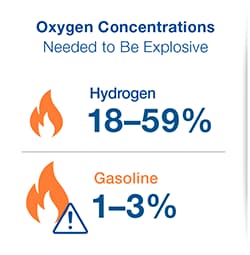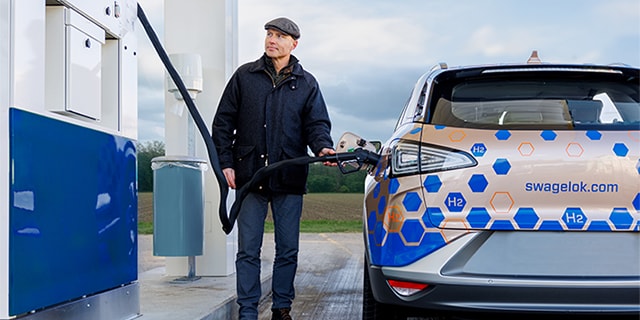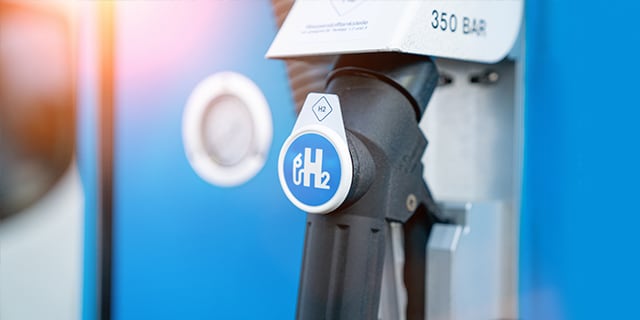Is Hydrogen a Safe Fuel Source?

Yes, Hydrogen Is a Safe and Effective Fuel Source
Chuck Hayes, Global Technical Lead, Swagelok
Hydrogen is a promising alternative to traditional fuels due to its potential to deliver zero-emission power in both transportation/mobility and general industrial applications. It is increasingly drawing interest as organizations and individuals around the world seek to reduce their carbon footprints. Yet misunderstandings about hydrogen’s viability as a fuel source abound, leading to confusion regarding just how much we can rely on it as a means of decarbonizing our world.
Have you heard that hydrogen transportation is potentially unsafe? That it’s impractical? That it’s expensive? That it can’t meet today and tomorrow’s environmental standards? If so, you aren’t alone.
Unfortunately, these statements are misleading at best and outright false at worst. Whether you’re a clean energy professional or just an interested consumer, it’s worth diving deeper to fully understand the truth about hydrogen’s potential.
This article is the beginning of a series in which we will provide build upon higher-level resources highlighting common myths surrounding the use of hydrogen fuel. This first installment addresses common safety concerns about hydrogen storage and use.
Hydrogen Minimizes Risks Associated with Leaks

Given that hydrogen is combustible, there is often concern about explosion risk, as well. Yet a hydrogen explosion is inherently less likely than explosions involving other fuel sources. For hydrogen to explode, oxygen concentrations between 18% and 59% are required. Gasoline, meanwhile, can explode at oxygen concentrations between 1% and 3%. Additionally, gasoline can ignite at significantly lower temperatures than hydrogen, posing a higher risk during transport and dispensing. The air surrounding a hydrogen flame is not as hot as a gasoline flame, making it less likely that a hydrogen-based fire would spread. For these reasons, hydrogen presents a much more robust fire-related safety profile than traditional fossil fuels.
Hydrogen poses fewer hazards than fossil fuels and also has the benefits of being nontoxic and less volatile.
Did You Know?
Have you heard that hydrogen transportation is potentially unsafe? That it’s impractical? That it’s expensive? That it can’t meet today and tomorrow’s environmental standards? If so, you aren’t alone.
Hydrogen fuel is monitored by numerous agencies to make sure its safety profile is standardized across international boundaries.
Those agencies include CSA (Canadian Standards), ISO (International Organization for Standardization), and EN (European Standards).
Hydrogen Is Safe to Store
Because hydrogen is stored under pressure, some people express concern regarding the safety of hydrogen transportation. But pressurized gas tanks have been around for many decades and are the foundation of a multibillion-dollar industry. Hydrogen tanks are significantly safer than traditional gasoline tanks because hydrogen dispensers monitor the entire system—their own hoses and valves as well as those of the storage system—for leaks at the beginning, middle, and endpoint of refueling systems. Gasoline leaks are usually only detectable once the fuel puddles on the ground.
If a leak does occur, hydrogen has the advantage of being 14 times lighter than air and will quickly disperse into the atmosphere, limiting the chance for accidental ignition at ground level. By contrast, gasoline is heavier, and vapor may collect on the ground where a stray spark could lead to a fire or explosion.
The Bottom Line
Hydrogen has a significantly better safety profile than most conventional fuels. It is less likely to ignite and is far less likely than conventional fossil fuels to negatively impact the environment in case of leaks and spills. Properly designed storage and dispensing systems using leak-tight components optimized for hydrogen containment and transfer make hydrogen vehicles a strong alternative to traditional mobility fuels like gasoline.
Want to learn more about the budding hydrogen economy? Swagelok is invested in enabling its growth, continuously working to deliver reliable hydrogen solutions for companies on the leading edge of clean energy development. To continue growing your hydrogen fuel systems knowledge, explore relevant topics on Swagelok Reference Point using the link below.
Related Articles

Supporting the Production and Storage of Green Hydrogen
See how Everfuel is making hydrogen happen with the help of Swagelok products and expertise.

What to Look for in Hydrogen Valves
Valves are critical parts of hydrogen fluid systems. Learn what to look for in an ideal hydrogen valve and how it can contribute to safer, more reliable hydrogen transportation.

The Anatomy of a Hydrogen Fitting
Learn why fittings designed specifically for hydrogen applications can help fuel cell vehicle OEMs and infrastructure developers achieve safer and more reliable fuel systems.



